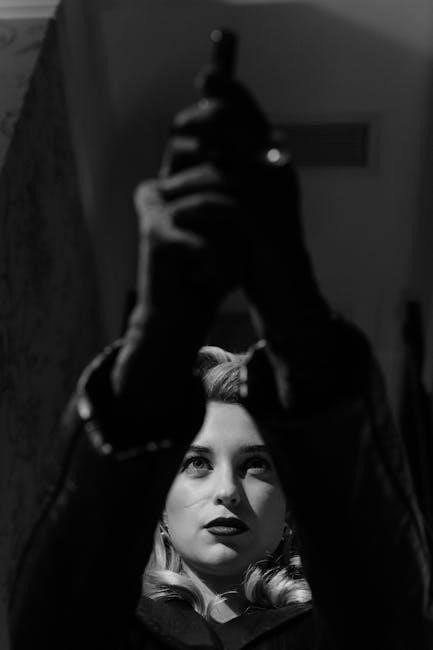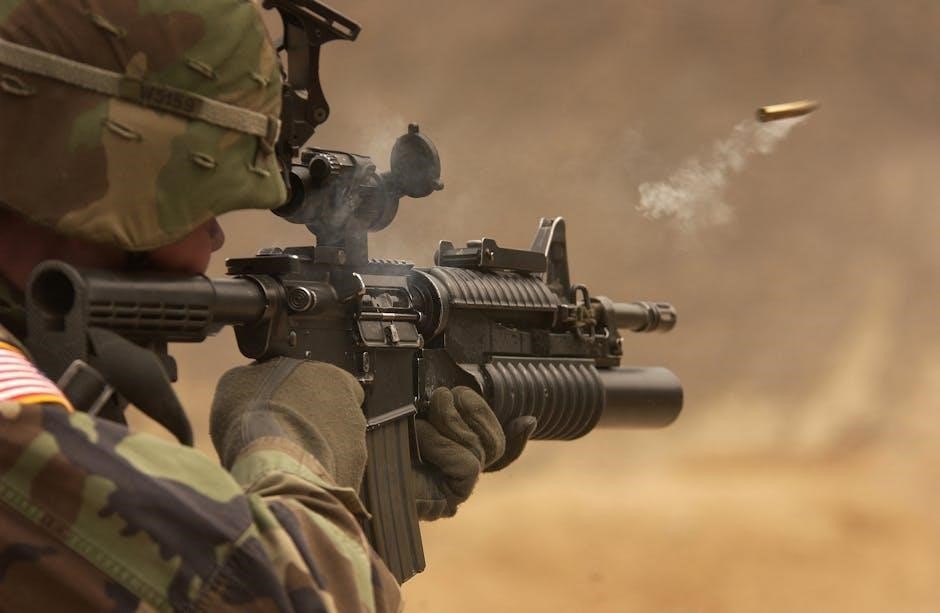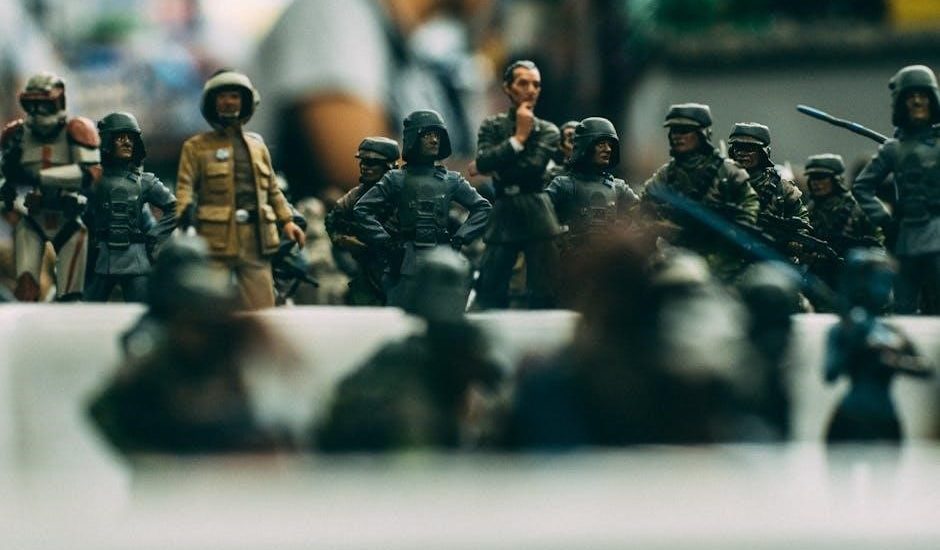Johnny Got His Gun, written by Dalton Trumbo, is a powerful anti-war novel published in 1939. It tells the story of Joe Bonham, a soldier severely injured in World War I, who becomes a prisoner in his own body, highlighting the horrors of war and the human cost of conflict.
1.1 Background of the Novel
Johnny Got His Gun, written by Dalton Trumbo, was first published in 1939 and remains a searing anti-war novel. Inspired by the devastating consequences of World War I, Trumbo crafted a story that reflects his deep-seated pacifism and critique of military propaganda. The novel was influenced by Trumbo’s own experiences and his witnessing of the brutal realities of war. Its vivid portrayal of a soldier’s physical and psychological destruction struck a chord, making it a powerful statement against the glorification of conflict. The book’s release coincided with the interwar period, resonating with a generation questioning the true cost of war.
1.2 Publication and Reception
Johnny Got His Gun was published in 1939 by J.B. Lippincott, marking Dalton Trumbo’s third novel. Initially, it sold approximately 7,000 copies, but its popularity grew over time, particularly during the Vietnam War era. Critics praised its raw, unflinching portrayal of war’s horrors, while some found its grim tone unsettling. The novel resonated with readers seeking anti-war literature, solidifying its place as a classic. Its controversial yet thought-provoking nature sparked debates, ensuring its enduring relevance and impact on anti-war movements. The book’s reception highlighted its bold critique of militarism and its ability to challenge societal norms.
Author Background: Dalton Trumbo
Dalton Trumbo, born in Colorado, lost his father early and worked in a bakery before pursuing writing. He wrote 88 short stories and six novels, all initially rejected, but gained acclaim with Johnny Got His Gun, showcasing his unique literary voice and anti-war perspectives.
2.1 Early Life and Influences
Dalton Trumbo was born in Colorado and grew up in a working-class family. After losing his father at a young age, he moved to Los Angeles, where he worked the night shift at a bakery while attending college. Trumbo’s early life experiences deeply influenced his writing, particularly his observations of societal inequalities and the struggles of ordinary people. These themes would later shape his literary work, including Johnny Got His Gun. His upbringing instilled in him a strong sense of empathy and a critical view of systemic injustices, which became central to his storytelling.
2.2 Literary Career and Motivations
Dalton Trumbo began his literary career writing short stories and novels, despite facing numerous rejections. His socialist beliefs and concern for the oppressed deeply influenced his work. Trumbo’s motivation stemmed from a desire to expose societal injustices and challenge the glorification of war. His experiences as a working-class individual and his refusal to testify before the House Un-American Activities Committee (HUAC) further shaped his writing. Trumbo’s persistence and commitment to his ideals led to the creation of Johnny Got His Gun, a novel that remains a powerful critique of war and a testament to his unwavering convictions.

Plot Summary of “Johnny Got His Gun”
Johnny Got His Gun follows Joe Bonham, a soldier severely injured in World War I, who awakens in a hospital realizing he has lost his limbs and senses. Trapped in his body, Joe struggles to communicate, recalling memories of his past life while fighting to maintain his sanity and assert his humanity in the face of unimaginable suffering.
3.1 Protagonist Joe Bonham’s Journey
Joe Bonham, the protagonist of Johnny Got His Gun, is a young soldier who enlists in World War I with idealism and patriotism. His life takes a tragic turn when a shell explosion leaves him severely injured, losing his arms, legs, and senses. Trapped in a hospital bed, Joe struggles to comprehend his new reality, oscillating between denial, despair, and determination. Through fragmented memories, Joe reflects on his past, including his childhood in Colorado, his job at a bakery, and his romantic relationship with Kareen. His journey is a harrowing exploration of isolation, loss, and the resilience of the human spirit.
3.2 The Realization of Joe’s Condition
Joe Bonham’s realization of his condition unfolds through a harrowing journey of discovery. Initially disoriented and confused, he gradually comprehends the severity of his injuries. The loss of his limbs and senses dawn on him as he struggles to move or feel, leading to overwhelming despair. His awareness of being trapped in a lifeless body brings profound emotional and psychological turmoil, marking a turning point in his internal battle with reality.
3.3 The Struggle to Communicate
Joe Bonham’s struggle to communicate is a poignant and desperate attempt to reconnect with the world. Trapped in his body, he devises a system using Morse code to express his thoughts. Despite initial failures, he persists, driven by the hope of being heard. A new nurse and a understanding doctor finally decipher his messages, offering Joe a lifeline. His communication reveals his desire to expose the horrors of war, showcasing his resilience and determination to transcend his physical limitations. This struggle underscores the novel’s themes of isolation and the human spirit’s fight for connection.
Themes in “Johnny Got His Gun”
The novel explores the horrors of war, loss, and isolation, while challenging propaganda and celebrating life’s value, offering a profound critique of conflict and human existence.
4.1 The Horrors of War
Johnny Got His Gun vividly portrays the devastating physical and psychological toll of war through Joe Bonham’s harrowing experience. Severely injured in World War I, Joe loses his limbs, senses, and identity, becoming a shell of his former self. The novel exposes the grotesque reality of modern warfare, where soldiers are reduced to mere fragments of humanity. Trumbo’s graphic depiction of Joe’s suffering challenges romanticized notions of war, revealing its brutal, dehumanizing nature. The novel underscores the irreversible damage war inflicts, leaving survivors trapped in a living nightmare of isolation and despair, far from the glory often associated with combat.
4.2 Loss and Isolation
Johnny Got His Gun profoundly explores themes of loss and isolation through Joe Bonham’s tragic experience. Joe loses his limbs, senses, and identity, rendering him a prisoner in his own body. His inability to communicate exacerbates his isolation, leaving him disconnected from the world. The novel highlights the emotional toll of such losses, as Joe grapples with the breakdown of his sense of self. Trumbo’s depiction of Joe’s isolation serves as a powerful commentary on the dehumanizing effects of war, emphasizing the irreversible physical and psychological damage that leaves individuals disconnected and alone in their suffering.
4.3 Propaganda and Reality
Johnny Got His Gun starkly contrasts war propaganda with its harsh realities. The novel critiques how societies glorify war, using slogans like “Johnny, get your gun!” to entice enlistment, while obscuring the true horrors faced by soldiers. Joe Bonham’s mutilation and isolation expose the lies of patriotic rhetoric, revealing the devastating consequences of war. Trumbo’s narrative dismantles romanticized notions of heroism, instead presenting a raw, unfiltered depiction of suffering. The novel underscores the disconnect between the ideals propagated by governments and the brutal truths experienced by individuals, serving as a scathing indictment of war’s manipulation and its impact on humanity.
4.4 The Value of Life
Johnny Got His Gun profoundly explores the value of life through Joe Bonham’s harrowing experience. Despite his physical and sensory deprivation, Joe clings to his consciousness, asserting his humanity. The novel highlights life’s intrinsic worth, even in its most diminished form, challenging societal norms that equate worth with physical ability. Trumbo’s portrayal of Joe’s resilience underscores the importance of preserving life and dignity, urging readers to question the cost of war and the expendability of individuals. This theme resonates universally, emphasizing the need to cherish life in all its forms and to strive for a world that prioritizes peace over destruction.

Historical Context
Johnny Got His Gun reflects the devastation of World War I and the interwar period’s rise of pacifism, resonating during the Vietnam War era’s anti-war movement.
5.1 World War I and Its Impact
Johnny Got His Gun is set against the backdrop of World War I, a conflict that shattered ideals and exposed the brutality of modern warfare. The novel vividly portrays the physical and emotional toll on soldiers, as seen through Joe Bonham’s devastating injuries. Trumbo critiques the romanticization of war, highlighting the disconnect between patriotic propaganda and the harsh reality faced by soldiers. The novel underscores the lasting psychological and societal impacts of the war, resonating with themes of disillusionment and the human cost of conflict, making it a powerful commentary on the futility of war. Its message remains timeless.
5.2 The Interwar Period and Pacifism
Johnny Got His Gun reflects the growing anti-war sentiment during the interwar period, as society grappled with the aftermath of World War I. The novel critiques the glorification of war and highlights the devastating consequences for soldiers like Joe Bonham. Trumbo’s work resonated with the rising pacifist movement, which sought to expose the harsh realities of conflict and advocate for peace. The interwar years saw a shift in public perception, with many questioning the justification for war. Trumbo’s portrayal of Joe’s suffering became a powerful symbol of the futility of war, aligning with the era’s growing disillusionment and calls for nonviolence.
5.3 The Novel’s Relevance in the Vietnam Era
Johnny Got His Gun gained renewed significance during the Vietnam War as its anti-war themes resonated with a new generation. The novel’s depiction of Joe Bonham’s physical and emotional trauma mirrored the experiences of Vietnam veterans, sparking widespread empathy. The 1971 film adaptation further amplified its message, aligning with the era’s growing opposition to the war. Trumbo’s work became a rallying point for anti-war activists, emphasizing the human cost of conflict and the importance of questioning military propaganda. Its timeless critique of war’s horrors ensured its relevance, making it a powerful symbol of resistance during the Vietnam era.

Symbolism and Motifs
Johnny Got His Gun employs powerful symbolism, with darkness and silence representing Joe’s isolation and loss of humanity. The hospital symbolizes his entrapment and the dehumanizing effects of war.
6.1 The Use of Darkness and Silence
Dalton Trumbo uses darkness and silence as profound motifs in Johnny Got His Gun. Joe Bonham’s physical blindness and deafness immerse him in an eternal void, mirroring his emotional and psychological isolation. The absence of light symbolizes the loss of hope and understanding, while silence underscores his inability to communicate or connect with the world. These elements amplify the novel’s anti-war message, highlighting the dehumanizing effects of conflict and the existential despair that accompanies such profound loss.
6.2 The Symbol of the Hospital
The hospital in Johnny Got His Gun serves as a stark symbol of confinement and control. It represents a sterile, isolating environment that strips Joe Bonham of his autonomy and identity. The hospital’s clinical atmosphere contrasts with the chaos of war, yet it mirrors the dehumanizing effects of conflict. Doctors and nurses, though well-intentioned, operate within a system that prioritizes order over individual dignity. For Joe, the hospital becomes a prison, where his physical and emotional suffering are managed but not truly addressed. This setting underscores the novel’s critique of institutionalized control and the erasure of personal freedom in the name of care.
6.3 The Role of Memory
Memory plays a crucial role in Johnny Got His Gun, serving as Joe Bonham’s lifeline to his past and his only means of escape from his trapped existence. Through vivid flashbacks, Joe recalls moments from his childhood in Colorado, his relationship with Kareen, and his experiences before the war. These memories provide comfort and purpose, allowing Joe to maintain a sense of identity despite his physical limitations. However, they also intensify his despair, as he contrasts the richness of his past with the bleakness of his present. Memory thus becomes both a source of solace and a reminder of all that he has lost.

Character Analysis
Johnny Got His Gun centers on Joe Bonham, a young soldier whose severe injuries transform him into a tragic figure. His journey from a vibrant life to complete physical dependence highlights the devastating impact of war on individuals, exploring themes of identity, loss, and resilience through his internal struggles and reflections.
7.1 Joe Bonham: The Tragic Hero
Joe Bonham, the protagonist of Johnny Got His Gun, embodies the archetype of a tragic hero. A young soldier in World War I, Joe is rendered limbless, blind, deaf, and mute after a devastating injury. His physical state symbolizes the dehumanizing effects of war, while his internal monologue reveals a profound struggle for identity and purpose. Initially consumed by despair, Joe gradually finds strength in his resolve to communicate, seeking to expose the horrors of war. His journey from denial to acceptance and activism underscores his tragic heroism, transforming him into a symbol of resilience and anti-war advocacy.
7.2 Supporting Characters and Their Roles
The supporting characters in Johnny Got His Gun play crucial roles in highlighting Joe Bonham’s journey and the novel’s themes. Joe’s mother embodies maternal grief and acceptance, while his father represents a lost patriarchal figure. Kareen, Joe’s girlfriend, symbolizes the life and love he forfeited for war. Bill Harper and Howie, Joe’s friends, reflect the camaraderie and innocence of his pre-war life. In the hospital, the new nurse and the doctor serve as Joe’s only connections to the outside world, illustrating both hope and the systemic barriers to his communication. These characters underscore Joe’s isolation and the broader anti-war message.

The Anti-War Message
Johnny Got His Gun delivers a stark anti-war message, exposing the brutal realities of conflict and the dehumanizing effects of military propaganda, advocating for pacifism and humanity.
8.1 Critique of Military Propaganda
Johnny Got His Gun sharply critiques military propaganda by contrasting the romanticized notion of war with its brutal reality. Joe Bonham’s severe injuries and loss of limbs expose the lies of heroic narratives, revealing war’s dehumanizing impact. The novel highlights how propaganda glorifies enlistment, as seen in the ironic reference to the “Johnny, get your gun!” slogan, while ignoring the devastating consequences for soldiers. Trumbo’s portrayal challenges the illusion of noble warfare, instead presenting a raw, unflinching truth about the physical and emotional toll on individuals, urging readers to question the motivations behind such propaganda.
8.2 The Cost of War on Individuals
Johnny Got His Gun vividly portrays the physical and psychological toll of war on individuals through Joe Bonham’s harrowing experience. The novel emphasizes the loss of identity, autonomy, and hope as Joe, stripped of his limbs and senses, becomes a mere shell of his former self. His inability to communicate and his reliance on hospital staff underscore the dehumanizing effects of war. Trumbo’s depiction of Joe’s suffering challenges the notion of war as noble, instead illustrating the profound personal sacrifices and lifelong traumas endured by soldiers, making the novel a poignant anti-war statement.
8.3 The Call for Pacifism
Johnny Got His Gun serves as a powerful call for pacifism, urging readers to reject war and its glorification. Through Joe Bonham’s tragic experience, Trumbo highlights the futility of conflict and the exploitation of soldiers by those in power. Joe’s realization that he has become a mere tool of war sparks his desire to educate others about its horrors. His failed attempt to communicate his anti-war message underscores the systemic suppression of dissent. The novel ultimately advocates for a world where individuals unite against those who profit from war, emphasizing the need for collective action to achieve peace and justice.
Literary Style and Structure
Johnny Got His Gun employs a non-linear narrative and stream of consciousness to convey Joe Bonham’s fragmented thoughts. Trumbo’s vivid imagery and intense emotional focus amplify the novel’s anti-war themes.
9.1 Narrative Techniques
Dalton Trumbo employs a non-linear narrative in Johnny Got His Gun, blending Joe Bonham’s past memories with his present hospital experiences. This structure creates a sense of disorientation, mirroring Joe’s own fragmented reality. Trumbo also uses stream of consciousness to deeply immerse readers in Joe’s thoughts and emotions, intensifying the psychological impact of his condition. The vivid juxtaposition of Joe’s idyllic memories with the bleakness of his current state underscores the novel’s anti-war message, making the narrative both haunting and powerful in its exploration of human suffering and resilience.
9.2 The Use of Stream of Consciousness
Dalton Trumbo’s use of stream of consciousness in Johnny Got His Gun immerses readers in Joe Bonham’s inner world, creating a visceral connection to his thoughts and emotions. This narrative technique allows for unfiltered introspection, capturing the chaos and disorientation of Joe’s fragmented reality. Through this style, Trumbo conveys the psychological toll of Joe’s isolation and physical suffering, while also highlighting his resilience and determination. The fluid, unstructured nature of Joe’s thoughts mirrors his internal struggle, making the reader experience his despair and hope simultaneously, and intensifying the novel’s emotional and anti-war impact. This technique is central to the novel’s profound storytelling.
9.3 The Impact of the Non-Linear Narrative
The non-linear narrative in Johnny Got His Gun enhances the novel’s emotional depth by interweaving Joe Bonham’s past memories with his present suffering. This structure disrupts the reader’s expectations, creating a sense of disorientation that mirrors Joe’s own confusion. Through flashbacks, Trumbo reveals Joe’s happy childhood, relationships, and motivations, contrasting them with his grim reality in the hospital. This juxtaposition underscores the tragedy of his condition and deepens the anti-war message. The non-linear approach also builds suspense, as readers piece together Joe’s injuries and his ultimate realization, intensifying the novel’s psychological and emotional impact. This narrative choice is pivotal to the story’s compelling nature.
Cultural Impact
Johnny Got His Gun has profoundly influenced anti-war movements, inspiring protests and sparking debates about the true cost of conflict. Its themes remain timeless and deeply relevant.
10.1 The Novel’s Influence on Anti-War Movements
Johnny Got His Gun became a cornerstone of anti-war literature, inspiring widespread protests and debates. Its gritty portrayal of war’s horrors resonated deeply during the Vietnam War era, fueling public opposition. The novel’s vivid depiction of Joe Bonham’s suffering symbolized the devastating consequences of conflict, urging readers to question the glorification of war. It influenced anti-war movements globally, sparking discussions about the ethical and human costs of military action. Trumbo’s work remains a powerful rallying cry for pacifism, emphasizing the need for societal change and accountability for those who propagate war.
10.2 Adaptations and Interpretations
Johnny Got His Gun has been adapted into various forms, including a 1971 film directed by Dalton Trumbo himself. The film, starring Timothy Bottoms, stayed true to the novel’s anti-war message, though it faced challenges in translating the book’s internal monologue. Additionally, the novel has inspired stage plays and continues to be a subject of academic analysis. Its themes have influenced other works, ensuring its relevance across different mediums. These adaptations highlight the enduring power of Trumbo’s narrative, making it a timeless critique of war and its impact on humanity.
10.3 Public Reception and Controversies
Johnny Got His Gun sparked intense debate upon its release, with its graphic depiction of war’s consequences shocking readers. The novel was both praised for its raw honesty and condemned for its perceived anti-patriotic themes. During the Vietnam War, it gained renewed relevance, becoming a symbol of anti-war activism. However, its controversial nature led to bans in some schools and libraries. Despite this, the novel has been celebrated for its unflinching portrayal of war’s human cost, solidifying its place as a powerful and thought-provoking work that challenges societal glorification of conflict and encourages critical reflection on the true horrors of warfare.

The Novel’s Legacy
Johnny Got His Gun remains a timeless classic, influencing anti-war movements and literary works. Its powerful message continues to resonate, ensuring its relevance across generations and mediums.
11.1 Timeless Relevance of Its Themes
Johnny Got His Gun remains strikingly relevant today, as its themes of war’s horrors, loss, and the dehumanizing effects of conflict continue to resonate. The novel’s exploration of propaganda versus reality, the value of life, and the psychological toll of warfare speaks to contemporary issues, making it a vital read. Its critique of militarism and advocacy for pacifism align with ongoing debates about the ethics of war. Trumbo’s vivid portrayal of Joe Bonham’s suffering serves as a universal warning, ensuring the novel’s enduring impact on discussions about peace and humanity.
11.2 Influence on Other Works
Johnny Got His Gun has profoundly influenced anti-war literature and film. Its harrowing portrayal of war’s consequences inspired numerous works, including the 1971 film adaptation directed by Trumbo. The novel’s vivid imagery and emotional depth have shaped pacifist narratives, encouraging authors and filmmakers to explore similar themes. Its impact is evident in works that critique militarism and highlight the human cost of conflict, ensuring Trumbo’s message resonates across generations and mediums, solidifying its place as a cornerstone of anti-war storytelling.
11.3 Educational Significance
Johnny Got His Gun holds significant educational value, often included in school curriculums to provoke critical thinking about war and its consequences. The novel challenges students to question the glorification of war, fostering empathy and understanding of historical contexts. Its vivid portrayal of Joe Bonham’s suffering encourages discussions on the human condition, ethics, and societal responsibility. By exploring themes of loss and isolation, the book helps students develop analytical skills and moral reasoning, making it a powerful tool for educating future generations about the realities of conflict and the importance of peace.
Johnny Got His Gun remains a timeless anti-war novel, offering a searing critique of conflict and a profound exploration of humanity. Its enduring relevance ensures continued resonance in discussions about peace, sacrifice, and the human condition.
12.1 Summary of Key Points
Johnny Got His Gun, written by Dalton Trumbo, is a haunting anti-war novel published in 1939. It follows Joe Bonham, a soldier gruesomely injured in World War I, who becomes trapped in a limbless, senseless body. The novel explores themes of war’s horrors, loss, isolation, and the value of life, while critiquing propaganda and the human cost of conflict. Through Joe’s journey, Trumbo delivers a powerful anti-war message, emphasizing the devastating impact of war on individuals. The novel’s vivid storytelling and moral urgency ensure its enduring relevance, making it a timeless critique of militarism and a call for peace.
12.2 Final Thoughts on the Novel’s Importance
Johnny Got His Gun remains a timeless and haunting critique of war, offering a raw, unflinching portrayal of its consequences. Through Joe Bonham’s tragic story, Dalton Trumbo underscores the dehumanizing effects of conflict and challenges the glorification of war. The novel’s powerful anti-war message resonates across generations, making it a crucial read for understanding the human cost of militarism. Its ability to provoke reflection and empathy ensures its enduring relevance, solidifying its place as a landmark of anti-war literature and a call for peace that transcends time and circumstance.





